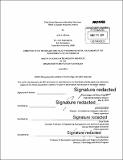Data-driven resource allocation decisions : FEMA's disaster recovery centers
Author(s)
Moline, Julia N. (Julia Nessa)
DownloadFull printable version (31.89Mb)
Other Contributors
Massachusetts Institute of Technology. Technology and Policy Program.
Advisor
Jarrod Goentzel and Erica Gralla.
Terms of use
Metadata
Show full item recordAbstract
Resource allocation decisions in post-disaster operations are challenging because of situational dynamics, insufficient information, organizational culture, political context, and urgency. We propose a methodology to create a data-driven decision process for post-disaster resource allocation that enables timely, transparent and consistent decision-making during crisis. Our methodology defines the decisions that must be made, identifies relevant historical, initial, and trending data sources, and develops numerical thresholds, quantitative relationships, and optimization models to support decision making. The general process also offers flexibility to consider non-quantitative factors and spans multiple review periods. We apply this methodology to the Federal Emergency Management Agency's (FEMA) program for establishing and managing Disaster Recovery Centers (DRCs) after a disaster. A detailed case study of one disaster response and relevant historical data provide the basis for DRC decision making thresholds, relationships, and optimization models. We then apply the newly developed process to several recent disaster response scenarios and find that FEMA could have reduced cost by 60-80% while providing sufficient capacity for survivors. Finally, we discuss the generalizability of the methodology to other post-disaster programs along with limitations and potential future work.
Description
Thesis: S.M. in Technology and Policy, Massachusetts Institute of Technology, Engineering Systems Division, Technology and Policy Program, 2014. Cataloged from PDF version of thesis. Includes bibliographical references (pages 100-102).
Date issued
2014Department
Massachusetts Institute of Technology. Engineering Systems Division; Technology and Policy ProgramPublisher
Massachusetts Institute of Technology
Keywords
Engineering Systems Division., Technology and Policy Program.